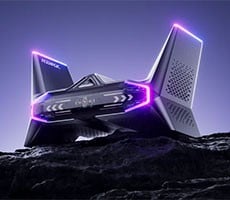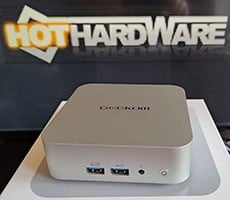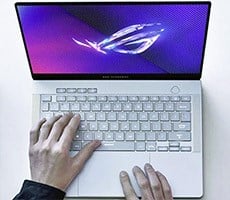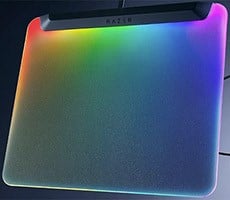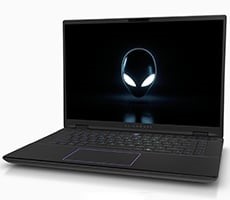AceMagic Starship M2A Review: Speedy, Sci-Fi Inspired Mini PC
Could a mini-PC packing previous-generation parts compete with the shiny news ASUS with Ryzen R9 8945HS CPU and GeForce RTX 4070 laptop GPU? You'll see soon enough.
ATTO Disk Benchmark
The ATTO disk benchmark is a quick and simple test which measures a drive's read/write bandwidth and IOPS across a range of different file sizes. While we don't typically compare these results across multiple machines, it's useful to gauge whether a particular system's storage subsystem is up to snuff.
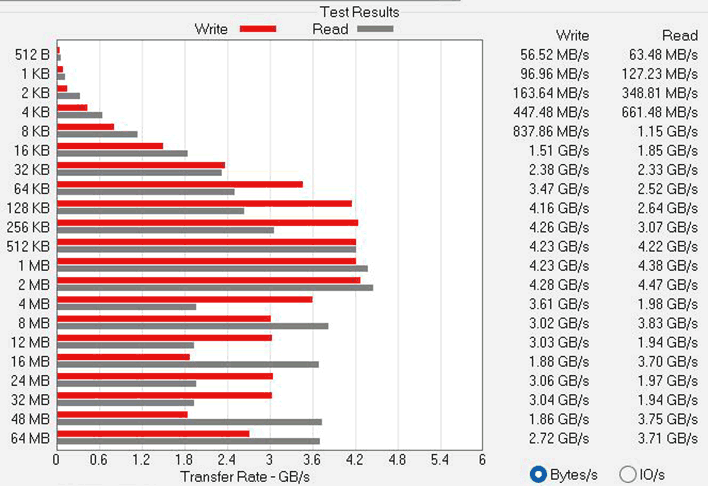
The 1TB RS1D0TSSD710 PCIe Gen4 SSD from Rayson, which was included in the AceMagic StarShip M2A, didn't deliver consistent performance. Despite multiple re-boots and re-tests, ensuring minimal background processes were running and letting the system reach an idle state before invoking a test, the inconsistencies remained.
In day to day use the SSD seemed to work fine, and the system feels snappy, but a reasonably good PCIe Gen4 x4 SSD should have been able to hit approximately 5GB/s writes and 6GB/s reads, with much more consistency. We would have liked to have installed a quality, DRAM-cache equipped "7.5GB/s" Gen4 SSD we had on-hand for direct comparison, but are still waiting for disassembly instructions for the M2A (this is a unique beast to crack open, and we didn't want to breaking a loaner).
Speedometer 2.0 Browser Benchmark
We used BrowserBench.org's Speedometer 2.0 test to gauge web application performance. This test automatically loads and runs several sample web apps from ToDoMVC.com using the most popular web development frameworks around, including React, Angular, Ember.js, and even vanilla JavaScript. This test is a better example of how systems cope with real web applications, as opposed to a pure JavaScript compute test like JetStream. All tests were performed using the latest version of Chrome.
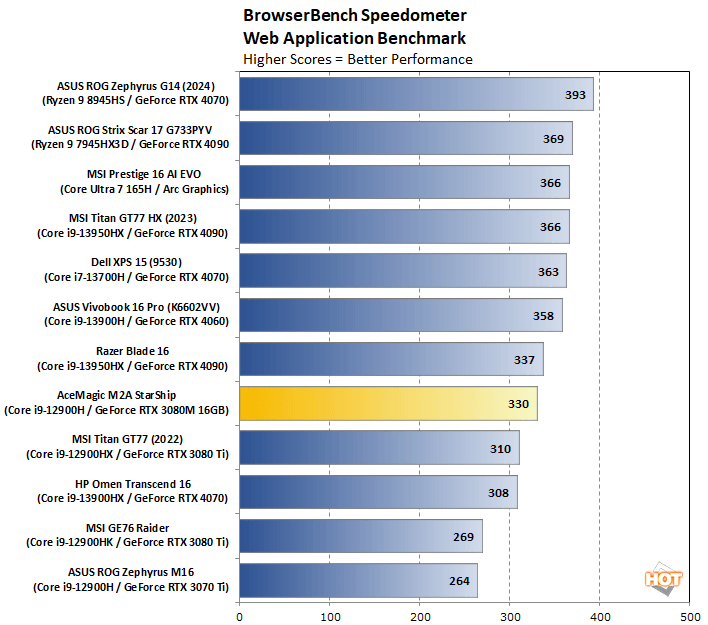
In this browser-based test the StarShip M2A performed well. It ultimately landed about in the middle the chart, but its hanging with some of the fastest gaming laptops we have tested to date.
Cinebench 2024 Rendering Benchmark
This is the latest 3D rendering benchmark from Maxon, based on the Cinema 4D rendering engine. We tested both single-threaded and multi-threaded tests on all of the systems represented here...
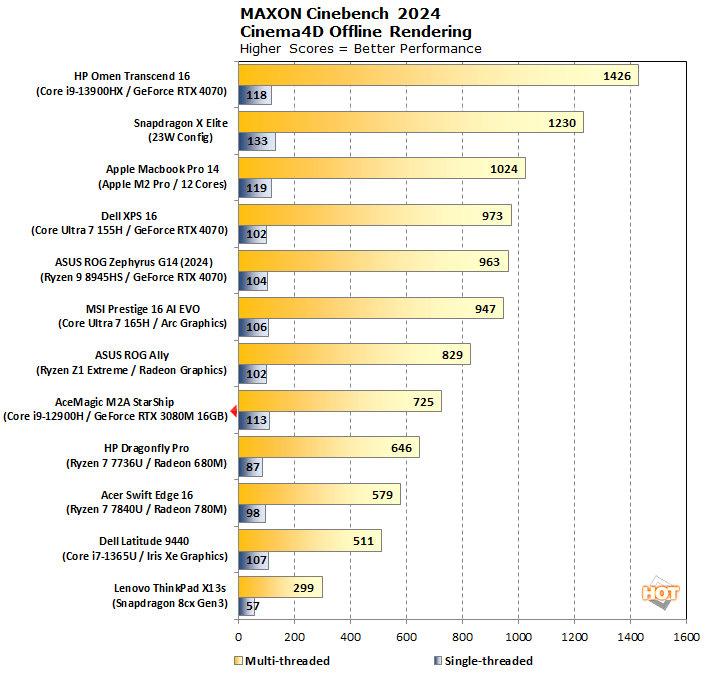
Cinebench 2024 exposes the Starship M2A's previous gen platform components. The devices with newer Intel Core Ultra and AMD Ryzen 8000 chips rise to the top, and the M2A lands behind the ASUS ROG Ally, at least in terms of CPU performance. However, when we compared GPU performance a little later, it's a totally different story.
Geekbench 6 Benchmarks
Geekbench is a cross-platform benchmark that simulates real world processing workloads in image processing and particle physics scenarios, among many others. We tested the systems featured here in Geekbench's single and multi-core workloads.
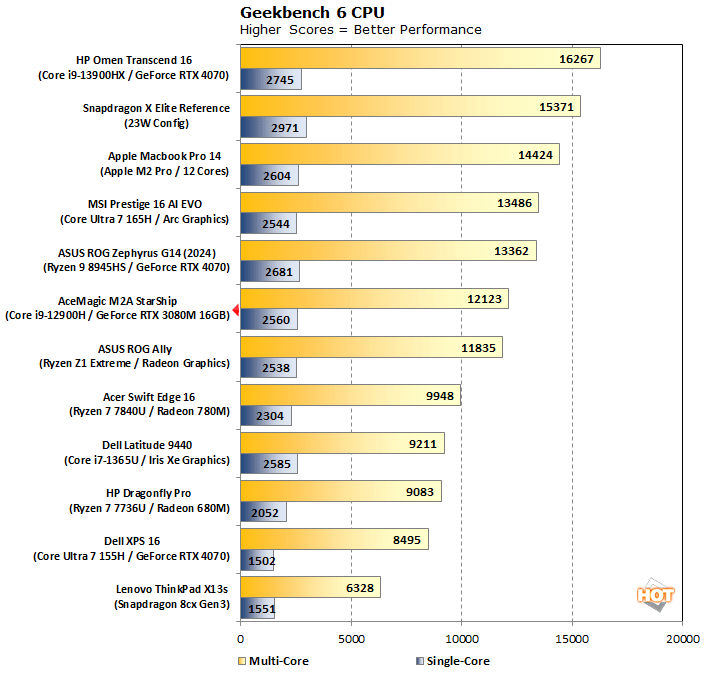
Once again the Starship M2A lands about in the middle of the pack, between the ROG Ally and latest ASUS Zephyrus G14.
PCMark 10 Whole System Benchmarks
PCMark 10 uses a mix of real-world applications and simulated workloads to determine how well a given system performs productivity tasks, including image and video editing, web browsing, and OpenOffice document editing. While these scores appear to be all over the place, the systems are sorted by their overall PCMark score, which is the third (gray) bar in each cluster.
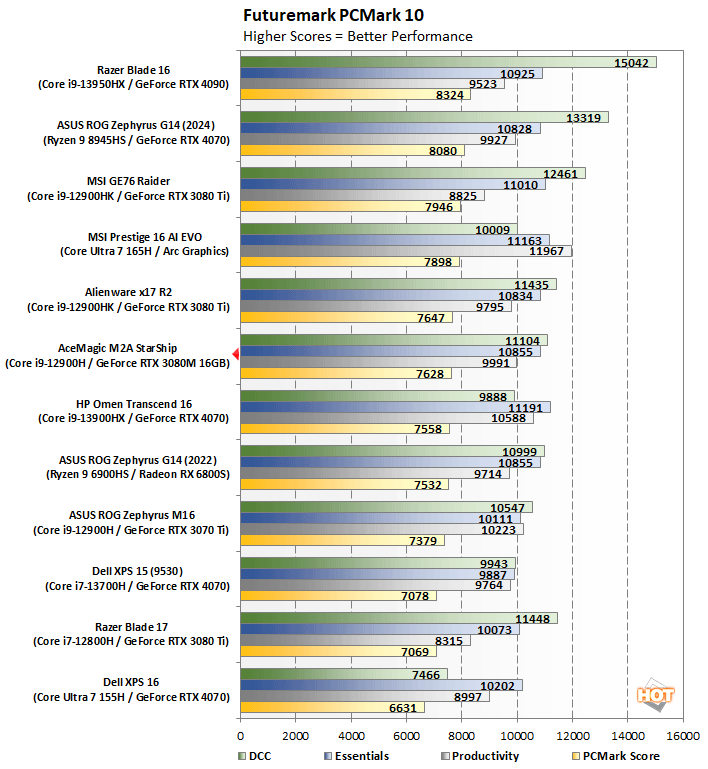
PCMark's various tests are influenced by all of the the Starship M2A's components. Here, the Core i9-12900H, the relatively powerful mobile GPU, 32GB of RAM and SSD push the system up the stack a bit, where it lands just behind the Core i9-12900HK powered Alienware system.
3DMark Graphics And GPU Tests
3DMark has several different graphics tests which focus on different types of systems. We start with Time Spy, which was 3DMark's headline benchmark until just recently. This test presents a pretty significant challenge for the system's CPU and GPU using advanced graphics and the DirectX 12 API...
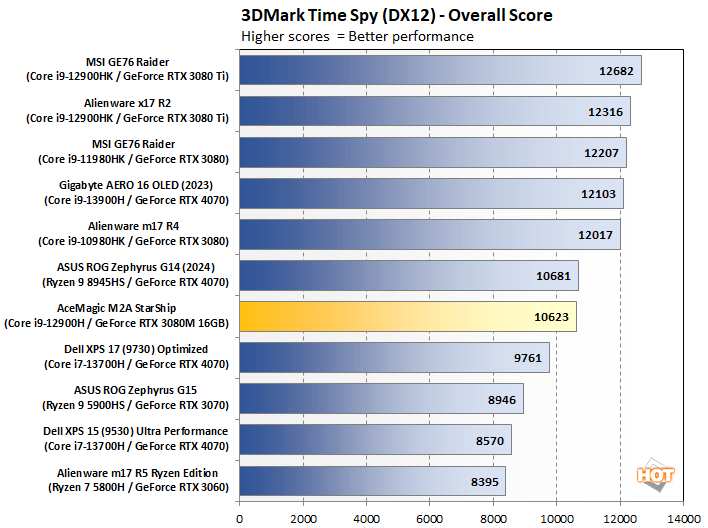
Our Time Spy tests indicate that the RTX 3080 laptop GPU in the StarShip can hang with the current-gen mobile GeForce RTX 4070, depending on the rated TGP. We also see the 115W GPU in the StarShip outperformed by the same GeForce RTX 3080 at 155W in the MSI GE76 Raider, and at 150W in the Alienware m17 R4, which were both launched back in 2021.
Port Royal is another synthetic benchmark from UL, this time adding ray tracing to the mix, for richer visuals and more realistic lighting...
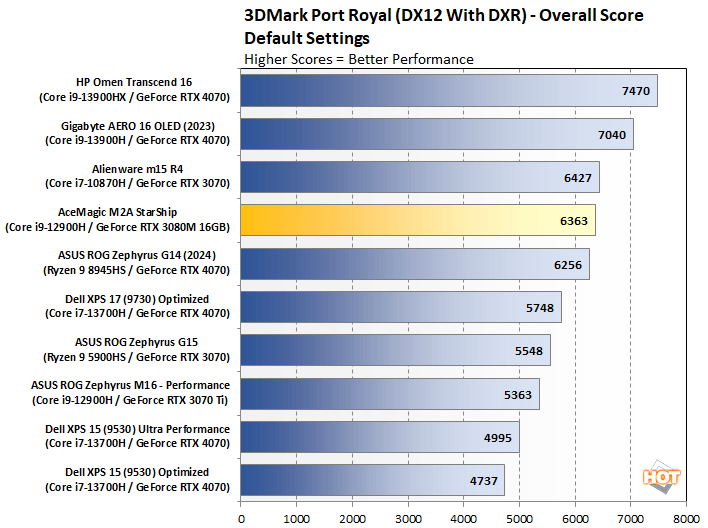
It is good to see the older RTX 3080 laptop GPU outclass some RTX 4070 rivals again. However, showing that watts is where it is at, an Alienware laptop with an RTX 3070 with a 140W power budget manages to edge ahead of the AceMagic StarShip M2A (with an RTX 3080 at 115W).
Middle Earth: Shadow Of War Tests
Middle Earth: Shadow of War is a fun and beautiful title set in Tolkien's Lord of the Rings universe. To test the game's performance relative to other systems, we set the resolution to 2560x1440 and turned the visuals up to the High preset. The frame rates here are the average reported by the built-in benchmark.
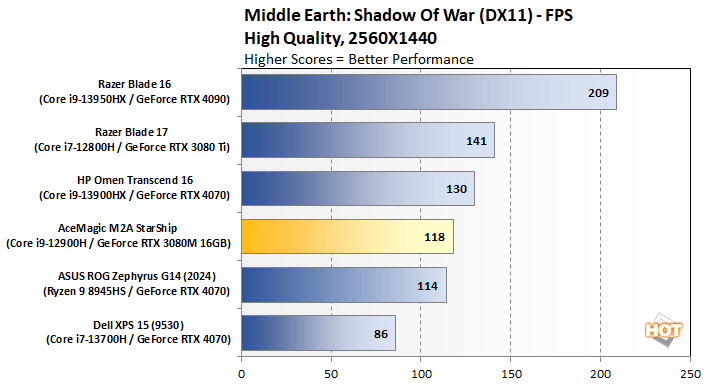
Here is another decent showing for the StarShip. However, while running these game tests, we wondered why the StarShip M2A's GPU wasn't configured for higher power level, to increaes performance. This is a dedicated desktop device, which has a body that is 2-inches thick at the thinnest section, always runs of A/C power, and uses AceMagic's 4D cooling system. As such, it SHOULD have more thermal headroom than a typical gaming laptop.
Shadow Of The Tomb Raider Benchmarks
The finale in the rebooted Tomb Raider trilogy, Shadow of the Tomb Raider is easily the best-looking of the bunch. It's also brimming with Tobii eye-tracking hardware support, and leading-edge graphics technologies. To test this game out, we again turned the visuals up to their highest preset and tested at a resolution of 2560x1440.
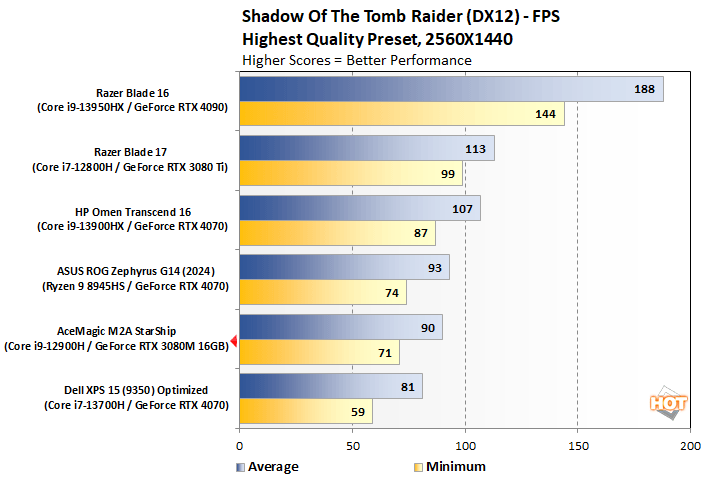
The StarShip lands toward the bottom of the chart, but still handles in 1440p with ease. An average 90fps and 71fps minimum delivers a silky smooth experience in this game.
Marvel's Guardians Of The Galaxy
Marvel’s Guardians of the Galaxy is an action-adventure game where you play as Star-Lord and lead the rest of the Guardians from mission to mission. The game’s minimum requirements call for a Radeon RX 570 or GeForce GTX 1060-class GPU, but it also supports some of the latest graphics technologies, including DXR and DLSS.
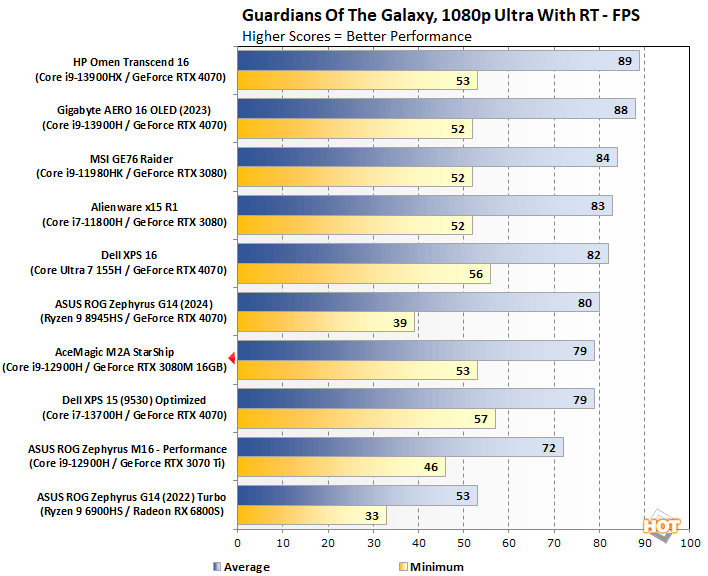

FrankenDriver To The Rescue
AceMagic's StarShip M2A uses a custom GeForce graphics driver, and warns that system owners can't use drivers direct from NVIDIA due to what the firm calls "compatibility issues." This is quite a common feature of some custom Mini PCs and desktop graphics cards which use mobile GPUs. One side-effect of this hardware/software anomaly is that owners of the M2A and similar systems will enjoy less frequent GeForce driver updates.
After completion of our test suite, we continued to experiment with the StarShip M2A and ran some other old favorite gaming titles from our library. Using the custom GPU driver that came pre-installed on the system The Division 2 from Ubisoft hung or crashed at the Easy Anti-Cheat opening dialog. Anti-cheat software could have problems with custom GeForce drivers that systems like the StarShip use.
We found an answer to these issues, though. The so-called FrankenDriver is an enthusiast-supported GeForce driver which is kept up to date with the latest releases from NVIDIA and where "only installer configs and .inf files are modified." Firing up The Division 2 after the FrankenDriver was installed resulted in the game working flawlessly on the AceMagic StarShip M2A's GeForce RTX 3080M.
Out of curiosity, we reran most of the games benchmarked above using the freshly installed FrankenDriver, but performance didn't change much and was within the margin of error. AceMagic recommends sticking with its driver, and a new (May 2024) version has just been released, but adventorous enthusiasts do have options, like the Frakendriver if they'd like to stay fully up to date at all times.

